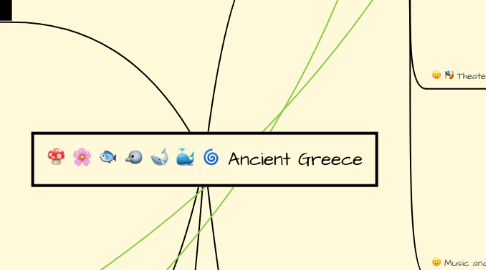
1. Cultural
1.1. Deities
1.1.1. Lived on Mt. Olympus
1.1.2. Looked like humans
1.1.2.1. Powerful
1.1.2.2. Beautiful
1.1.2.3. Gifted
1.1.3. Revered by the humans
1.1.3.1. Animal sacrifices
1.1.3.1.1. One part for the gods
1.1.3.1.2. One part for the worshippers
1.1.3.1.3. for funeral services
1.2. Young people
1.2.1. Children were abandoned at birth by their mothers if they didn't want the child
1.2.2. Young girls often married much older men, they could be married when the first hit puberty
1.2.3. Had drinking parties called symposium where children were often paid to entertain adults
1.3. Myths
1.3.1. Story about a being accomplishing great deeds
1.3.2. Told orally
1.3.3. Written down in the 8th century
1.3.3.1. Homer
1.3.3.2. Hesiod
1.4. Architecture
1.4.1. Ionic
1.4.2. Doric
1.4.3. Corinthian
1.5. Theater
1.5.1. Open air theaters
1.5.2. Comedies and tragedies
1.5.3. Epic poetry
1.5.3.1. The Iliad
1.5.3.2. The Odyssey
1.5.4. Annual celebrations of the theater/wine god Dionysus
1.6. Music and Art
1.6.1. Part of their daily lives
1.6.1.1. Education
1.6.1.1.1. Practied with a plectrum
1.6.1.1.2. Learned the lyre
1.6.1.2. Performed in public
1.6.1.2.1. Ceremonies
1.6.1.2.2. Gatherings
1.6.1.2.3. Festivals
1.6.1.2.4. Music contests
1.6.1.3. Pots often depicted aspects of daily life
2. Political
2.1. Democracy
2.1.1. Comes from the terms "demos" (the people) and "kratos" (rule of authority)
2.1.2. took power away from the wealthy land owners and tyrants
2.1.2.1. tyrants banned for ten years through an ostracism (voting)
2.1.2.1.1. Voting ballots were on a piece of pottery called an Ostrakon
2.1.3. gave power to citizens
2.2. Slavery System capitalized o spoils of war
2.3. Polis - City State
2.3.1. Athens
2.3.1.1. Most powerful city state
2.3.1.2. Created a defensive alliancee to against the Persians
2.3.1.3. First known democracy
3. Human-Environmental
3.1. Men
3.1.1. Ploughing with oxen
3.1.2. Sowing seeds
3.2. Demeter
3.2.1. Goddess
3.2.1.1. Agriculture
3.2.1.2. Fertility
4. Social
4.1. Abandoned babies the they didn't want
4.2. Slavery
4.2.1. Due to the Persian war many slaves were Persians
4.2.2. poor people did not own slaves
4.2.3. Women were sometimes employed as wet nurses who breat fed the family's children
4.3. Love<3
4.3.1. Women often married much older men sometimes twice their ages
5. Economic
5.1. Slavery
5.2. Agriculture
5.2.1. Olives
5.2.2. Grapes
5.2.3. Grains
5.3. Trade
5.3.1. Europe
5.3.2. Asia
5.3.3. Africa
5.4. Industry
5.4.1. Mining
5.4.1.1. Stones
5.4.1.1.1. Weaponery
5.4.1.1.2. Building
5.4.1.1.3. Everyday tools

